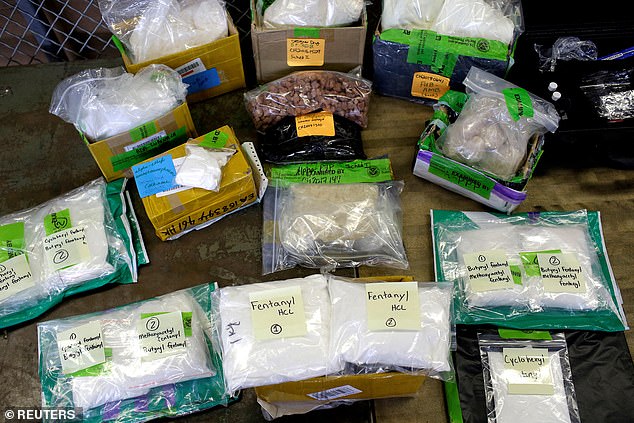Ron DeSantis makes it a CRIME for drug users to expose first responders to fentanyl and blames Biden’s ‘unwillingness to secure the border’ as reason police face more danger
Gov. Ron DeSantis signed a bill Monday that would make it a crime in Florida for someone to knowingly expose law enforcement officers and first responders to fentanyl.
He warned perpetrators that he would “throw the book at you” if they lie to agents about the presence of fentanyl when responding to a call, and blamed President Joe Biden’s “unwillingness to secure the border” in worsening of the opioid crisis.
“When you put fentanyl into our communities, you kill people,” DeSantis said during a press conference on Monday. “And you should be treated like the murderer that you are.”
The dangerous narcotic has been used shamefully in recent years by human traffickers who mix other drugs with the deadly substance. Thousands of accidental overdoses and deaths have occurred as a result of the fentanyl epidemic – especially as the crisis at the southern border continues.
Fentanyl, unlike many other dangerous narcotic drugs, does not have to be ingested to be dangerous and can enter the body in harmful amounts, even through accidental inhalation of the powder substance or, rarely, through contact with the skin.
Florida Governor Ron DeSantis signed a bill Monday that would make it a crime to expose first responders to fentanyl or other dangerous narcotics

Along with the massive flow of illegal immigration across the southern border, drug trafficking has also risen to unprecedented levels and fentanyl is killing record numbers of Americans
One story DeSantis often cites is that a toddler died after crawling onto the floor of an AirBnB and coming into contact with fentanyl residue in the carpet. He told the tragic story on Monday during the signing of the bill.
“These are bad things and there are situations where law enforcement personnel are responding to situations that may involve fentanyl,” the Florida governor noted. “They’re really putting themselves at risk, because it’s not like they have to take pills to get this.”
In addition to the flood of border crossings at the southern border and the masses of illegal immigrants living in the country due to the migrant crisis, drugs are also flowing into the US through Mexico at record speeds.
DeSantis is one of the nation’s most staunchly anti-illegal immigration governors and is helping lead efforts to send aid to the southern border and also implement laws in his state to address the crisis.
Florida, for example, is at the forefront and involved in a number of lawsuits against the Biden administration over its so-called “parole” program that flies in 30,000 undocumented migrants every month from Cuba, Nicaragua, Haiti and Venezuela and releases them into the country without legal status. .
The heaviest burden of the conditional flights is being felt in Florida, where more than 300,000 people have been flown by the Biden administration in the past year.
To further address how the migration crisis is impacting Florida’s drug problem, Governor DeSantis signed the bill Monday, making it a crime to expose first responders to fentanyl or other analog drugs such as Vicodin, Oxycontin or Percocet.
“This bill, (SB) 718, provides that any adult who, through unlawful possession of dangerous fentanyl or analogs, exposes a first responder to that fentanyl that results in an overdose or serious bodily harm – we are going to prosecute you as a second-degree felon because he has done that,” DeSantis said at a news conference Monday as he signed the bill.
“So when an officer says, ‘Do you have drugs in your possession?’ and you lie and then the officer is exposed and injured, we’re going to throw the book at you and we’re going to hold you accountable,” he added.
“We want to ensure that the people who wear the uniform are protected.”
Analogous drugs are drugs that are chemically similar to illegal narcotics, but are available with a valid and legal prescription.
